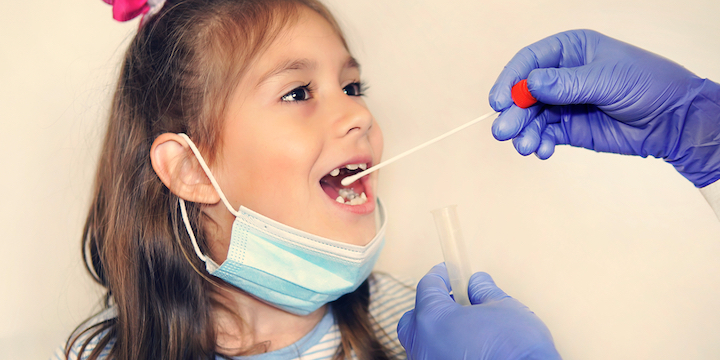The Haute Autorité de Santé (HAS) gave the green light on Thursday 11 February. It will be possible to perform saliva detection tests for Covid-19 on people without symptoms, allowing repeated screenings in schools and universities. However, these are not quick tests that give results in 40 minutes.
These tests on saliva samples (sputum) will be analyzed “in the laboratory or as part of organized screening platforms”, said Dominique Le Guludec, president of the College of the High Authority of Health (HAS).
“Multiply collective screening operations”
With these saliva tests, which show satisfactory performance, “we are going to multiply collective screening operations, particularly in the direction of schools (…), but also universities”, announced the Minister of Health Olivier Véran on the 4th February during a press conference alongside Prime Minister Jean Castex.
“These saliva tests were already authorized (and reimbursed, editor’s note) on people with second-line symptoms, that is to say mainly when the nasopharyngeal test is difficult or poorly tolerated,” she recalled.
“Today, we are extending them to two other indications”, “it is just a question of widening the indications in which they will be reimbursed”, she continued.
“Good level of performance”
The HAS recommends extending them “to contact persons also in second intention” but “especially to iterative screening (repeated: editor’s note) in targeted populations such as schools, universities, nursing homes, nursing staff”, specified Ms. Le Guludec.
“Their very good acceptability and their good level of performance are particularly suited to this type of screening, and in particular to their repetition,” she added.
Precautions to be observed
The time limit for submitting the self-sample to the laboratory must be as short as possible and not exceed 5 hours. The sample will be analyzed during the day in the laboratory, noted Dr. Cédric Carbonneil of the HAS.
The collection of saliva can be done directly in the laboratory or at home in a tube provided in a collection kit, not to be put in the refrigerator.
The sample should not be taken within 30 minutes after eating, smoking or brushing teeth, he said with Ms. Le Guludec.
Adaptation for children
For children under the age of six, who do not necessarily know how to spit, there is the possibility of collecting saliva using a small pipette, said Dr. Carbonneil, favoring self-sampling rather than ‘in the laboratory, white coats tend to impress children.
 Cherry tomatoes contaminated with salmonella: 92 sick and 1 dead
Cherry tomatoes contaminated with salmonella: 92 sick and 1 dead  A better coaching method can make a person grow
A better coaching method can make a person grow  What is the method to prevent diabetes in children?
What is the method to prevent diabetes in children?  What are the effective factors in causing stomach ulcers?
What are the effective factors in causing stomach ulcers?  Why do embarrassing memories seem to appear at night?
Why do embarrassing memories seem to appear at night?  The amazing link between SARS-CoV-2 infection and newly started diabetes
The amazing link between SARS-CoV-2 infection and newly started diabetes  WHO says monkey pox is not a global emergency right now
WHO says monkey pox is not a global emergency right now  Single cell RNA sequencing uncovers new mechanisms of heart disease
Single cell RNA sequencing uncovers new mechanisms of heart disease  Hepatitis of unknown origin: 3 new deaths and 228 cases worldwide
Hepatitis of unknown origin: 3 new deaths and 228 cases worldwide 